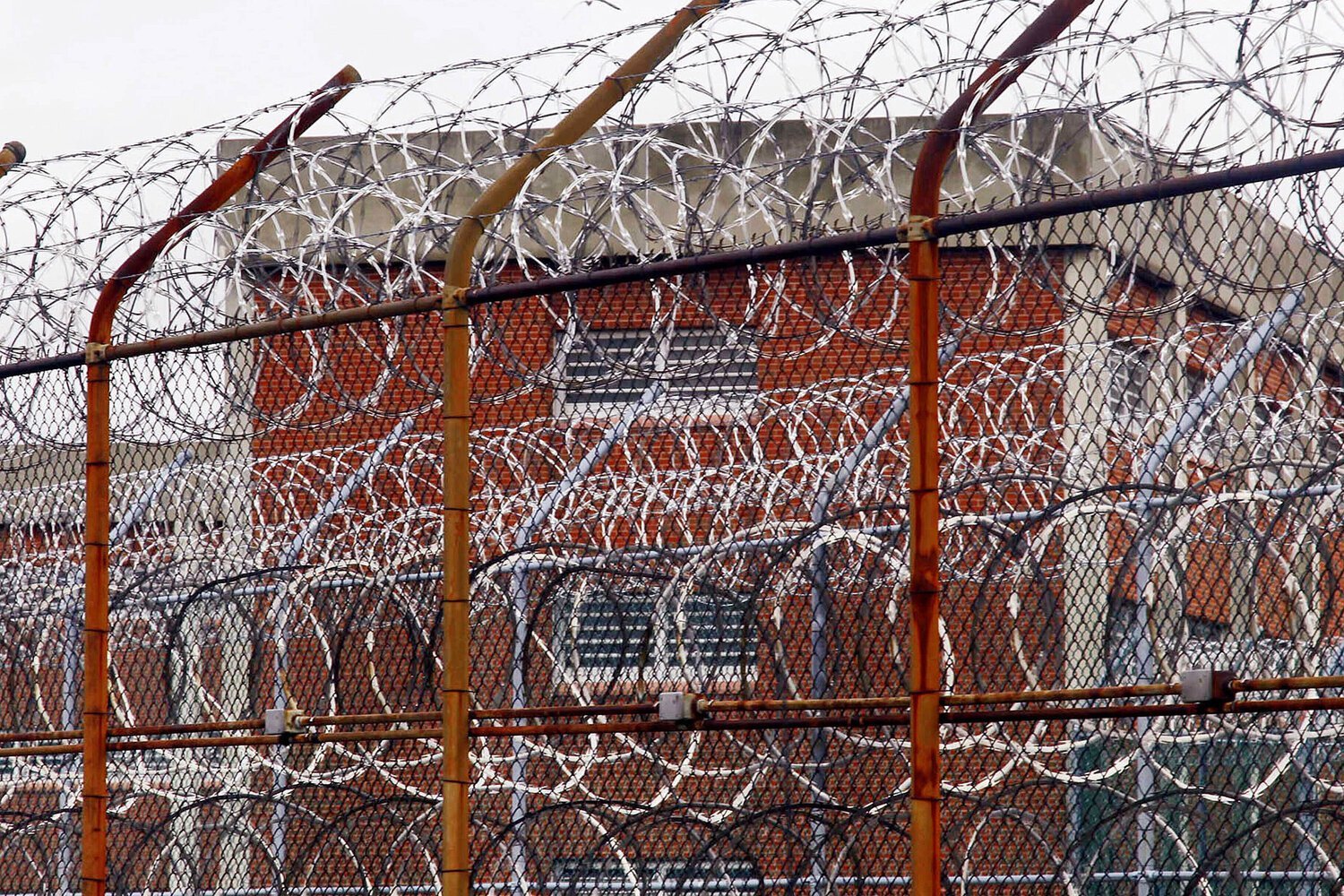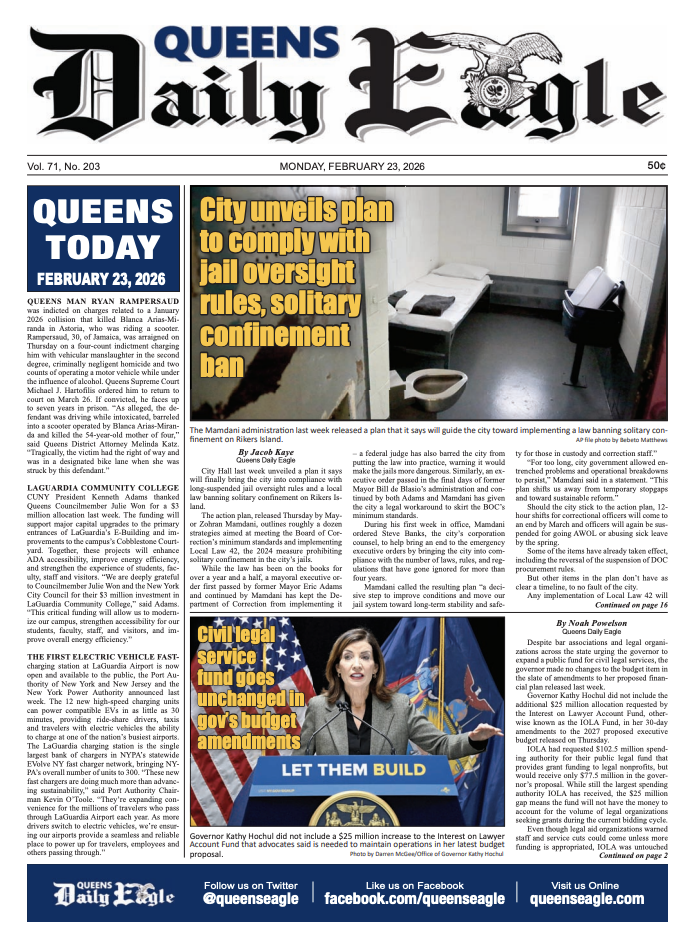$3 billion and 2 years tardy: Proposed jail contract blows past Rikers closure deadline
/A new proposed contract to build one of the four borough-based jails to replace Rikers Island would extend two years beyond the city’s legally-mandated deadline to close the current jail complex. AP file photo by Bebeto Matthews
By Jacob Kaye
Will the city be able to close Rikers Island by 2027? Likely not, if a newly proposed contract to build the first of the city’s upcoming four borough-based jails is approved as is.
The City’s Department of Design and Construction posted a public notice this week for a proposed contract issued for the building of the Brooklyn jail facility, the first of the city’s planned four borough-based jails set to serve as the replacements for Rikers Island.
Though the city is required by law to close the troubled jail complex by 2027, the proposed $2.9 billion contract between the city and Tutor Perini Corporation in New Rochelle is not set to expire for 2,317 days, or around two and a half years past the city’s deadline. Many of the details of the contract, which has not been finalized, have yet to be released.
“Anything that’s going to delay closure past 2027 is unacceptable,” said Zachary Katznelson, the executive director of the Independent Commission on New York City Criminal Justice and Incarceration Reform.
“This [contract] isn’t a done deal, but if this goes forward, we’re talking about quite possibly not closing Rikers until the next decade,” he added.
The city will hold a public hearing on the contract later this month, and will likely hear a number of concerned criminal justice reformers and lawmakers expressing dismay over the contract’s timeline.
The city is mandated by law to close Rikers Island as a jail facility by the summer of 2027. Under the law known as the Renewable Rikers Act, which was sponsored by former Queens City Councilmember Costa Constantinides, the island would reopen as a renewable energy hub.
But the proposed Brooklyn jail contract is only the latest in a growing number of signs that the closure of the jail complex by the city’s own deadline is dubious at best.
Combined, the four borough-based jails will have enough beds to house 3,300 detainees. However, Rikers’ current population is a little less than 6,000 detainees – higher than its been at any point dating back to December 2019 – and it is expected to rise to 7,000 by the end of the year.
Additionally, the city has missed several deadlines and milestones associated with the Renewable Rikers Act and appears to be headed down a path to miss several more.
The conflicting trends come as Mayor Eric Adams has begun to publicly doubt the city’s ability to hit the deadline and has formed a committee to begin exploring a “plan b.”
A spokesperson for the mayor’s office defended the proposed contract in a statement to the Eagle this week. Like the mayor, the spokesperson said that the intentions of the city’s laws to close Rikers do not reflect the reality facing the city’s corrections system.
“This contract reflects realities facing the construction industry and requirements laid out in the law passed by the City Council,” the spokesperson said.
“This administration will always follow the law, and the law says the jails on Rikers Island must close on time,” they added.
Though the proposed contract extends to October 2029, the spokesperson said that under the contract, substantial work on the Brooklyn facility is expected to be completed by April 2029, nearly two years after the city’s deadline.
Despite the Adams administration’s concern of the realities of the deadline, Katznelson said he doesn’t see a real reason why the city can’t begin working now to meet it.
“These are big construction projects but we have years to complete them,” he said. “The city has yet to give any rationale as to why we can’t do that on time.”
“It has to be our goal - close Rikers as soon as possible,” Katznelson added. “This contract is the opposite of that. It needs to be fixed but there’s still time to fix it.”
Last week, City Council Speaker and Queens City Councilmember Adrienne Adams dedicated the final moments of her State of the City speech to the closure of Rikers Island. Speaker Adams, whose mother served as a corrections officer, said the jail’s closure remains a priority of the Council, which originally set the wheels of the borough-based jails program in motion.
“The law is clear that the City must transition to borough-based jails by 2027,” Rendy Desamours, a spokesperson for the speaker’s office, said in a statement to the Eagle this week. “We expect all of the administration’s activities and contracts to be structured so the City is in compliance with the law.”
“There can be no double standard and the Council will exercise its full authority to ensure this administration follows the law,” Desamours added.
The speaker’s spokesperson also said that the administration needs to take “active steps” toward meeting the deadline, including expanding mental health and treatment programs, re-entry programs and supportive housing programs and increasing the speed at which the city’s courts hear cases.
The average stay on Rikers Island is currently around 280 days, a number that skews higher for those being held pre-trial on felony charges and those with a mental illness – around half of Rikers Island’s population has a mental illness diagnosis.
“With over half of those detained having a mental health diagnosis, it is clear that Rikers has become a de facto mental health facility, which only exacerbates people’s well-being,” Desamours said. “Safety can only be truly delivered with a commitment from this administration and all stakeholders to take the steps necessary to close Rikers.”
Despite the timeline of the proposed contract, the Brooklyn facility is scheduled to be the first of the four jail facilities to be completed.
The facility in Kew Gardens, located on the site of the former Queens Detention Center, is still in early stages. Though a parking garage next to the future jail is nearly complete, contracts concerning the building of the actual jail facility have yet to be issued.
Initially, the four borough-based jails were projected to cost around $8 billion dollars, more than twice as much as the Department of Correction’s current budget. However, the $2.9 billion price tag attached to the proposed contract suggests that by the time all four facilities are built, the final number will be larger.
According to the mayor’s spokesperson, the costs could be inflated by the effects of the pandemic on labor and supplies. Additionally, each floor of each facility is required to have space for performing minor medical procedures and spaces for counseling, enrichment and self-help programs, arts programs, religious services and video conferencing rooms.
But Katznelson said that the price of the jails pales in comparison to the price taxpayers will have to pay if Rikers stays open.
The jails are expected to be paid for with 30-year bonds, with an average annual cost per bond at around $770 million per year, saving the city around $1.2 billion per year, Katznelson claimed.
“This is obviously in the city’s best interest to move forward with the plan to close Rikers,” he said.
The Department of Citywide Administrative Services will hold a virtual public hearing on the proposed contract on Thursday, March 23, at 10 a.m.




